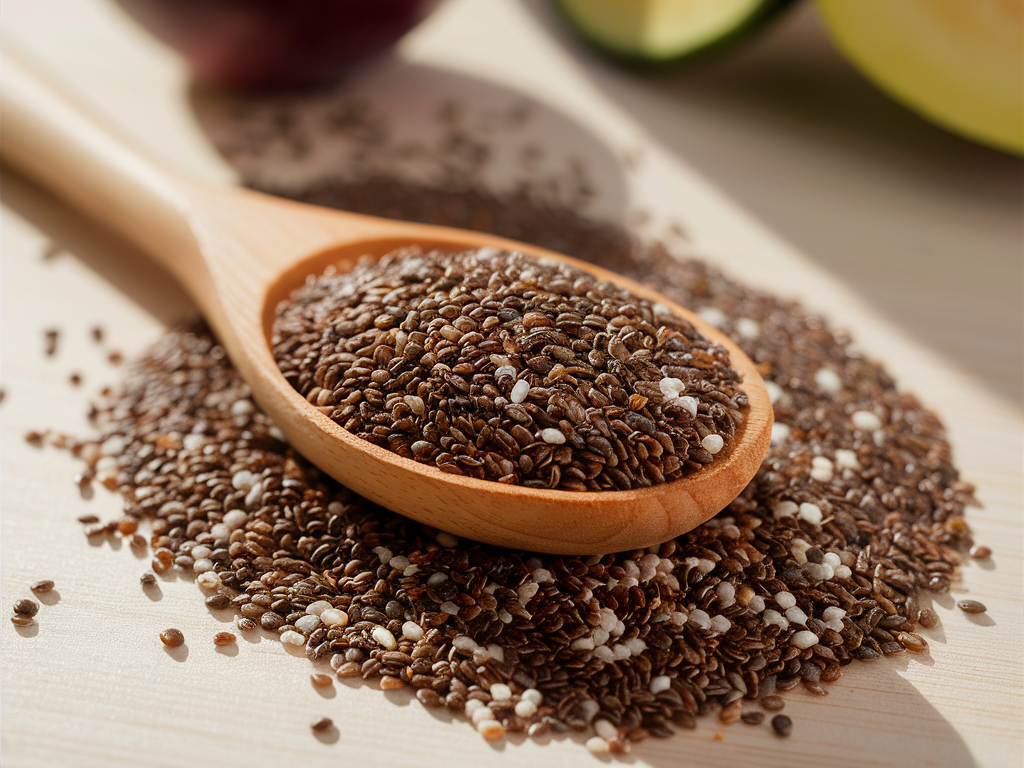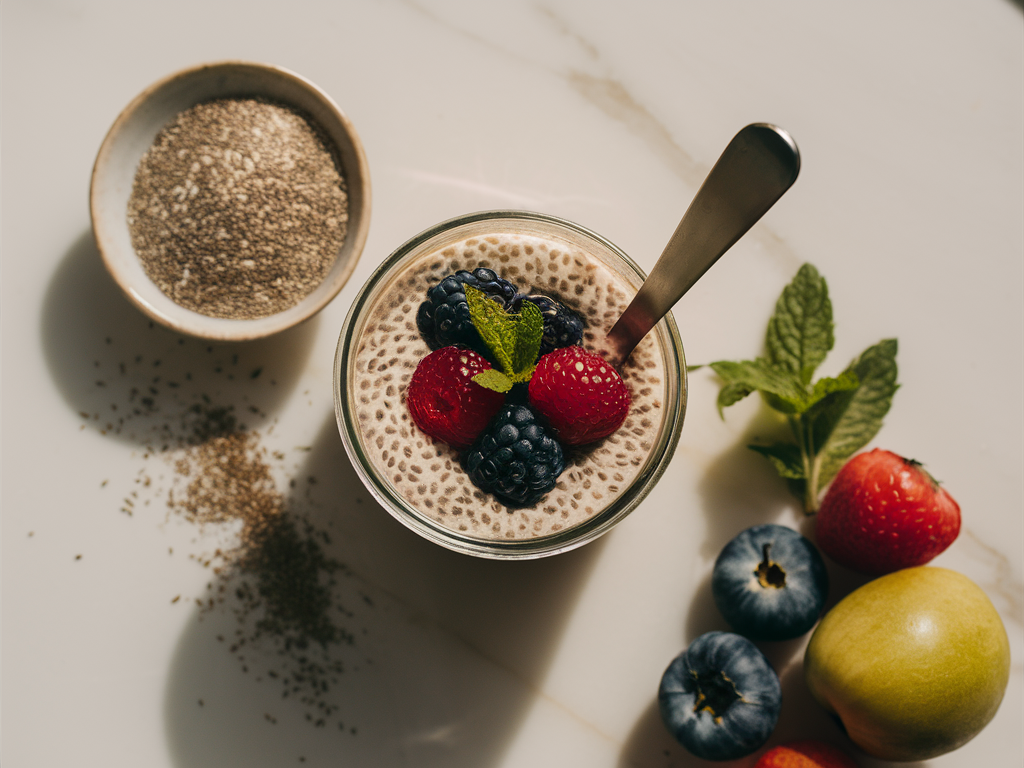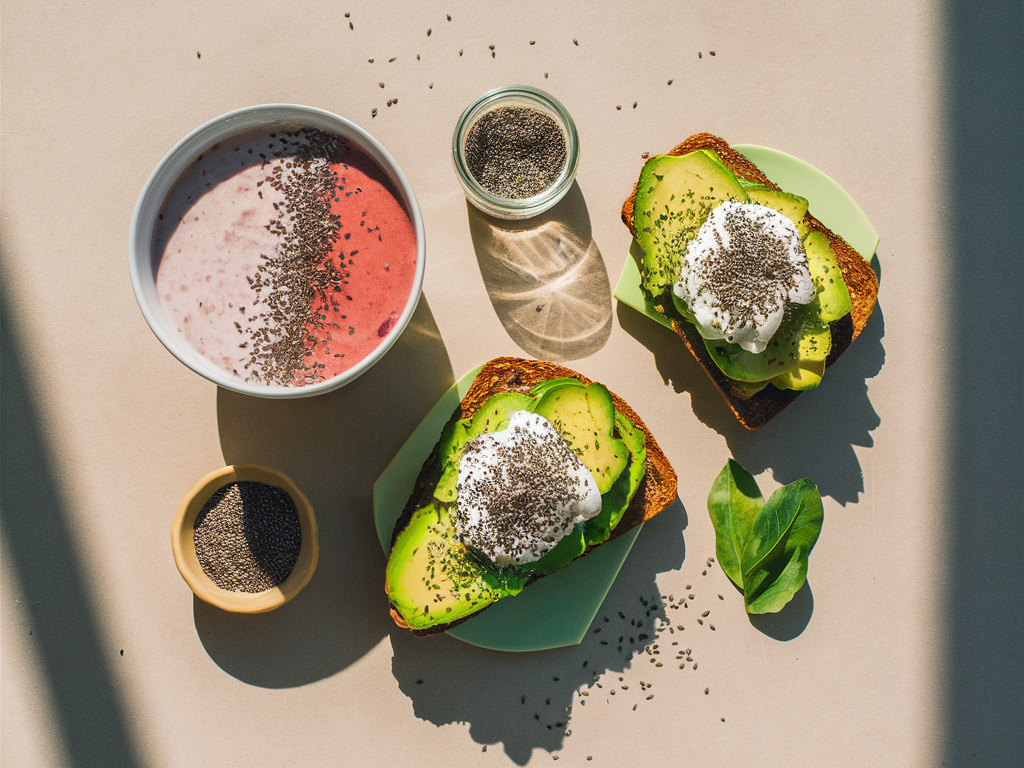Ancient civilizations have long treasured chia seeds as a potent energy source. The Aztecs and Mayans revered these tiny powerhouses for their incredible sustenance properties, with “chia” literally meaning “strength” in the Mayan language. Fast forward to today, and these small black and white seeds have experienced a remarkable resurgence in modern wellness circles, celebrated for their exceptional nutritional density and versatility.
What makes chia seeds so remarkable is their impressive nutritional composition packed into such a tiny package. They contain significant amounts of omega-3 fatty acids, fiber, high-quality protein, antioxidants, and various essential micronutrients—all while remaining low in calories. This nutritional profile has made chia seeds one of the most sought-after superfoods in contemporary health-conscious communities worldwide.
Benefit #1: Exceptional Source of Omega-3 Fatty Acids
When it comes to plant-based omega-3 sources, chia seeds stand in a class of their own. They contain more omega-3 fatty acids per gram than salmon, making them particularly valuable for plant-based diets. While fish oil provides EPA and DHA directly, chia seeds offer ALA (alpha-linolenic acid), which your body can convert to these bioactive forms.
Research indicates that the omega-3s in chia seeds may help reduce inflammation markers in the body, potentially alleviating symptoms of chronic inflammatory conditions. The cardiovascular benefits are equally impressive—regular consumption has been linked to improved cholesterol profiles, reduced blood pressure, and decreased risk of heart disease.
Health experts typically recommend consuming 1-2 tablespoons (12-24 grams) of chia seeds daily to reap these omega-3 benefits. This modest amount provides approximately 5 grams of omega-3 fatty acids, significantly contributing to the recommended daily intake of these essential nutrients.

Benefit #2: Powerful Fiber Content for Digestive Health
One of the most fascinating properties of chia seeds is their ability to absorb up to 12 times their weight in water. When soaked, they form a gel-like substance due to their soluble fiber content, creating a unique texture that can help transport food through your digestive tract efficiently.
This exceptional fiber profile—with approximately 10 grams per ounce—provides nourishment for beneficial gut bacteria, promoting a healthier microbiome balance. As these bacteria ferment the fiber, they produce short-chain fatty acids that support colon health and may reduce inflammation within the digestive system.
The substantial fiber content also helps prevent constipation by adding bulk to stool and facilitating more regular bowel movements. Additionally, emerging research suggests that the mucilaginous properties of chia may form a protective barrier along the intestinal lining, potentially reducing gut permeability issues associated with certain digestive conditions.
Benefit #3: Blood Sugar Regulation
For those monitoring glucose levels, chia seeds offer promising benefits. The gel that forms when chia seeds encounter liquid creates a physical barrier that slows the digestion and absorption of carbohydrates. This mechanism helps prevent rapid spikes in blood sugar that typically follow carbohydrate-rich meals.
Clinical studies have demonstrated that adding chia seeds to meals can lower post-prandial blood glucose levels and reduce insulin resistance over time. One notable study published in the Journal of Nutrition found that participants who consumed chia seeds with a high-carbohydrate meal experienced 20% less glucose elevation compared to control groups.
This glucose-modulating effect makes chia seeds particularly beneficial for diabetes management strategies. By incorporating them into meals, individuals can effectively lower the overall glycemic index of their diet, promoting more stable blood sugar levels throughout the day and potentially reducing the need for medication adjustments.
Benefit #4: Weight Management Support
The unique combination of protein, healthy fats, and substantial fiber in chia seeds creates a powerful satiety-promoting food. When consumed, the seeds expand in the stomach, increasing fullness sensations and potentially reducing overall caloric intake during subsequent meals.
Research into hunger hormones suggests that regular chia consumption may help normalize ghrelin levels—your body’s primary hunger-signaling hormone. This effect, combined with stable blood sugar levels, can significantly reduce the between-meal cravings that often derail weight management efforts.
While not a magic solution for weight loss, several clinical trials have shown modest but consistent weight reduction when participants incorporated chia seeds into calorie-controlled diets. At approximately 137 calories per ounce, chia seeds provide substantial nutrition without excessive energy intake, making them an ideal addition to balanced weight management programs.
Benefit #5: Bone Health Enhancement
Chia seeds contain an impressive mineral profile that directly supports skeletal integrity. A single ounce provides about 18% of daily calcium needs, 27% of phosphorus, and 30% of manganese—all critical nutrients for bone formation and maintenance.
When compared ounce-for-ounce with dairy products, chia seeds often contain more calcium and certainly more magnesium—a mineral equally important for bone health but often overlooked. This mineral combination makes chia particularly valuable for those avoiding dairy products or seeking complementary sources of bone-supporting nutrients.

For aging populations concerned about osteoporosis and bone density loss, regular consumption of chia seeds may provide protective benefits. The bioavailable calcium, combined with boron and other trace minerals in chia, supports the bone remodeling process that becomes increasingly important as we age.
Benefit #6: Muscle Recovery and Protein Source
Athletes and fitness enthusiasts have embraced chia seeds for their complete protein profile—containing all nine essential amino acids the body cannot produce itself. With approximately 4.7 grams of protein per ounce, they provide sustained energy and muscle-building nutrients in a convenient form.
The biological value of chia protein, while not as high as animal sources, offers advantages through its complementary nutrient profile. The anti-inflammatory omega-3s work synergistically with the protein to enhance muscle recovery after intense workouts, potentially reducing exercise-induced muscle damage.
Post-workout chia puddings and smoothies have become increasingly popular in fitness communities as research continues to validate their benefits for glycogen replenishment and protein synthesis. For plant-based athletes especially, chia seeds represent an important protein source that doesn’t require the processing many plant protein powders undergo.
Benefit #7: Heart Health Protection
The cardiovascular benefits of chia seeds extend beyond their omega-3 content. Regular consumption has been associated with improvements in multiple markers of heart health, including reduced LDL (bad) cholesterol, increased HDL (good) cholesterol, and lower triglyceride levels.
Their impact on blood pressure regulation appears particularly promising. Several clinical trials have documented significant reductions in both systolic and diastolic blood pressure after 12 weeks of daily chia consumption. These effects are likely due to the combination of omega-3s, antioxidants, and fiber working together to improve vascular function.
The anti-inflammatory properties of chia seeds may also protect arterial health by reducing systemic inflammation—a known contributor to atherosclerosis and cardiovascular disease. This multi-faceted approach to heart protection makes chia seeds a valuable addition to heart-healthy dietary patterns like the Mediterranean diet.
Benefit #8: Antioxidant Properties for Anti-Aging
Chia seeds contain impressive concentrations of antioxidants including quercetin, kaempferol, chlorogenic acid, and caffeic acid. These compounds neutralize free radicals that contribute to oxidative stress—a primary driver of cellular aging and many chronic diseases.
The antioxidant activity in chia is so potent that it actually helps preserve the seeds themselves, preventing the omega-3 fatty acids from going rancid despite long shelf storage. When consumed, these same protective compounds work throughout the body, reducing oxidative damage to cells and tissues.
At the cellular level, these antioxidants may help preserve telomere length—the protective caps on our chromosomes that shorten with age and stress. Some preliminary research suggests that the antioxidant profile in chia seeds could support cellular longevity pathways, potentially contributing to overall longevity.

Beyond internal benefits, many holistic practitioners report improvements in skin elasticity, hydration, and texture with regular chia consumption. The combined effect of omega-3s and antioxidants appears to support skin’s natural moisture barrier and collagen production, contributing to a more youthful appearance.
Benefit #9: Easy Integration into Daily Routine
Perhaps one of the most practical benefits of chia seeds is their incredible versatility and ease of use. Unlike flaxseeds which must be ground to access their nutritional benefits, chia seeds can be consumed whole, requiring no special preparation to release their nutrients.
The culinary applications are virtually endless—chia seeds can transform morning oatmeal, enhance smoothies with thickness and nutrition, create delicious puddings, replace eggs in vegan baking, or simply be sprinkled atop yogurt, salads, and other dishes for a nutritional boost and pleasant crunch.
Their remarkable shelf stability—lasting up to two years when stored properly in a cool, dry place—makes them a practical pantry staple. This longevity, combined with their concentrated nutrition, also makes chia seeds surprisingly cost-effective compared to many other superfoods that require refrigeration or special storage.
Conclusion
The evidence supporting chia seeds as a nutritional powerhouse continues to grow, validating what ancient civilizations understood centuries ago. From cardiovascular protection and blood sugar regulation to digestive health and anti-aging benefits, these tiny seeds offer remarkable health potential in an accessible, versatile package.
For most healthy adults, a daily intake of 1-2 tablespoons (12-24 grams) appears to provide optimal benefits without excessive calorie consumption. While generally safe for most people, those with swallowing difficulties, esophageal restrictions, or taking blood-thinning medications should consult healthcare providers before adding chia to their regimen.
If you’ve yet to explore the benefits of chia seeds, consider incorporating this ancient superfood into your modern wellness routine. With their exceptional nutritional profile and remarkable versatility, chia seeds represent one of the simplest yet most impactful dietary additions you can make for long-term health and vitality.

